As an historian, I find the end of wars to be fascinating historical moments, because they are times when one world comes to an end and another world has to form, and in that transition all manner of complex human interactions take place.
The end of World War II is particularly fascinating, especially given the global scale of that conflict. The end of the wars in the Indochinese Peninsula in 1975 are also fascinating, and there is still so much more that we can learn about that period.
I was reminded of this fact when I came across a memoir in the Virtual Vietnam Archive at Texas Tech University written by Rhee Dai Yong, a South Korean military officer who in 1975 was serving in a diplomatic capacity at the South Korean embassy in Saigon and who was in charge of the evacuation of South Koreans from South Vietnam at the end of the war.
In his effort to do so, Rhee stayed in South Vietnam after the fall of Saigon and was eventually arrested in October of 1975 and remained imprisoned until 1980. His memoir, written in English, covers this entire period and contains some fascinating information.
When the war ended, the South Koreans in South Vietnam were one could say “in double trouble.” First, they were on the “losing side” of the war. However, in addition to that, the other side of their own civil war – North Korea – was a close ally of North Vietnam, and when Saigon fell, North Korean agents quickly arrived on the scene and were determined to convince or coerce the South Koreans there to join their side.
Rhee notes, for instance, that already in early May 1975, “The Caravelle Hotel, located in a very busy section of Saigon, was flying a North Korean flag. Many members of the North Korean diplomatic mission could be seen at a hotel called Continental Paris located near the Caravelle. The North Korean Ambassador’s car was observed cruising through the city with an escort of Saigon police.” (39)
What transpired in the months that followed was a complex “cat and mouse” game where Rhee and other South Koreans sought to get out of the country but the North Koreans together with the security bureau of the Provisional Revolutionary Government of South Vietnam sought to keep them there.
There was a plan to escape by boat from Vung Tau, but many of the Koreans opposed this idea as they didn’t trust the drivers who were to transport them from Saigon to Vung Tau. In the end, only one Korean diplomat took this path, and his account of his escape has apparently recently been published.
Then there were efforts to leave the country officially/legally, but Cold War politics obstructed those efforts. In the summer of 1975, Rhee and others obtained approval to depart on a Red Cross plane but they were prevented from doing so.
“It became time to board. We were just on the verge of moving towards the boarding area with the UN diplomats when a man who looked as though he might be a high ranking official with the Security Bureau appeared. He asked that the Korean diplomats assemble separately. He then said, ‘The departure of the South Koreans will be postponed until further notice due to administrative problems.’” (41)
Then later in the summer the following events transpired:
“On August 29, it was announced that the UH had rejected the admission of both North and South Vietnam. The United States had exercised its veto powers. The Provisional Revolutionary Government of South Vietnam immediately suspended departures from the country of any national of the seven nations which had participated in the Vietnam War: Australia, New Zealand, Thailand, the Philippines, Taiwan and the Republic of Korea.”
American president, Ford, criticized this action, and the ban was lifted, except for Koreans. Lee writes that “The Koreans remained stranded. According to rumor, the North Koreans had compelled the South Vietnamese to tie the Koreans down. Here, there was no way of knowing the truth.” (57)
Finally, in the midst of all of these global-level politics were individuals who made their own individual political decisions. When, for instance, Rhee was finally arrested on 3 October 1975, he noticed that the interpreter who accompanied the security officers was a Korean-speaking and pro-North-Korean French-Vietnamese mixed-blood man who had formerly worked at the French Embassy in Saigon.
“His Korean was excellent,” Rhee recorded. “His face was white. His eyes were more Caucasian than Oriental. He was about 1 meter 60 cm tall. He was certainly of mixed blood.” (65)
Much of Rhee’s memoir is devoted to a record of information about his years in prison, and there are fascinating details that emerge. He provides quite a bit of information about time he spent in a cell with a Hoa Hao leader, for instance. And he talks about the love affairs between female prisoners and their guards (“All women in the prison acted in that fashion except for President Thieu’s sister-in-law.” [201]), all of which seemed to have ended badly.
Indeed, if any single point comes through Rhee’s memoir is that nothing seemed to be good for anyone at that time, and a change for the worse could come at any time.
Rhee, for instance, records some fascinating information about how the Vietnamese invasion of Cambodia led to changes at his prison. To quote:
“December 25, 1978: Vietnam invaded Cambodia and controlled Phnom Penh on January 9. It was an easy victory.
“The Hanoi government then purged Vietcong leaders. Some prison officers of the ED and ID buildings were ousted between January 25 and February 5. Ten were gone and only three remained. They just did custodians work. Former Vietcong became a laughing stock to the North Vietnamese.
. . .
“I asked a question to a former Vietcong Police Lieutenant who came to inspect our place: ‘How are you?’
“He signed and told me over a pack of cigarettes I offered. ‘I had had 20 years revolutionary work in the jungle. There I had three meals a day. Now, I’m hungry, starved to death.’” (205)
Given the fact that this memoir was written in English by a non-native speaker and appears to be a combination of both some of the notes he kept while in prison in combination with later explanations, it is not a “literary masterpiece.” But the information it contains is invaluable.
I had never heard, for instance, that there were Vietnamese who fled Vietnam and then returned, but this is what Rhee records:
“Seventeen hundred South Vietnamese in Guam returned to Vietnam several months after they had left Saigon. They had hopes of seeing their relatives, friends and homeland under the new regime. Their hopes were shattered. They were all sent to a prison in the northern Canhwa [Khanh Hoa] Province jungle. Many escaped the prison and many attempted to break. So the Vietnam government dispersed them in all prisons in the nation.”
Clearly this memoir records many fascinating issues for an historian to pursue further, and it is also a fantastic document to build a movie screenplay from. A movie definitely needs to be made about this!!!
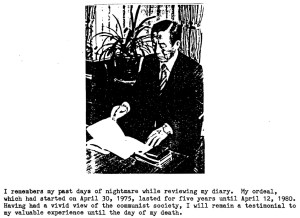
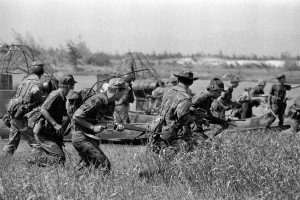
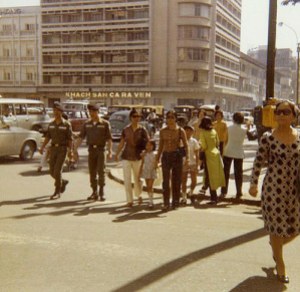
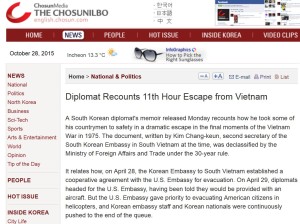
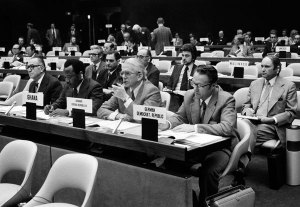
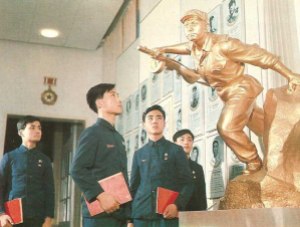
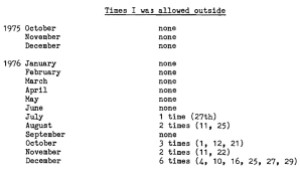
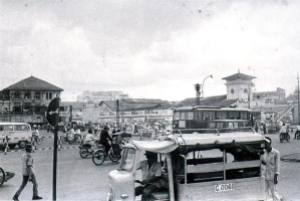
This Post Has 16 Comments
On returning Vietnamese, there was actually a well-known episode of an entire ship of South Vietnamese in Guam, the việt nam thương tín, that went back. A historian at Tulane has published a research essay on it, a very interesting one too, but of course there is more to discover. There’s even a Wiki entry – https://vi.wikipedia.org/wiki/Vi%E1%BB%87t_Nam_Th%C6%B0%C6%A1ng_t%C3%ADn_%28t%C3%A0u%29
Thanks for pointing this out. This must be what you are referring to:
Jana K. Lipman, “‘Give us a Ship’: The Vietnamese Repatriate Movement on Guam, 1975,” American Quarterly 64.1 (March 2012): 1-31.
Yes, it’s worth a read.
Thanks for introducing this memoir. There’s another end of war diary by a German in Saigon 1975 that looks very interesting. I only read an excerpt though and it’s probably not been translated to English 🙁
http://www.talachu.org/tacphamdich.php?bai=256
The whole system of political prison camps in Vietnam is fascinating and under researched. Vũ Thư Hiên’s memoir is full of interesting details. There are myriad memoirs by Republic of Vietnam soldiers who were imprisoned after 1975. There is an over-riding sense of the arbitrary in terms of who was punished and for how long.
I agree, and there is still time to talk to people. I hope someone will do that.
“Several backward and dictatorial nations, which evolved following the end of
Second World War, have ignored international laws, on occasion, illegally
detaining a number of foreign diplomats.” – Wow, that reflects very badly on the government of the Socialist Republic of Vietnam! When they go before international courts seeking redress of a grievance, one wonders what they should expect.
What does one expect after such a long and terrible war , so many deaths and misery ( words are much , much too poor ) inflicted by the French then by the Yankees and their mercenaries ? It ‘s living in a never never land ,in Alice’s wonderland to expect a pacified , courteous treatment towards the vanquished .
Look at the American civil war 300 years before , the north- south divide is still vivid under the surface of reconciliation , southerners are still bitter ; any opportunity and they would rise to exact revenge .
See the massacres acted by Syngman Rhee towards leftist opponents before the start of the Korean war ( Jeju island and others )
On the opposite , one should commend the Vietnamese communists for just imprisoning the south Korean diplomats and not shooting them on the spot.; anyhow the diplomats were not accreditated vis à vis the Hanoi regime ; remember also the untold atrocities inflicted by Korean mercenaries in central Vietnam .
At least , some South Koreans , mostly from Christian churches unlike the Yankees , did express repentance and atone for the Korean crimes ; it still will be a tarnish on the reputation of Korea for a long time , likewise with the Japanese and their WWII rampage
About the boat people , the VN communists were most humane , to let thousands of them flee the country ; how would the Khmer rouges have treated would be fugitives ?
The Viet nam Thuong Tin boat refugees were most naive to have come back ; anyone who knows the communists and their utmost mistrust would have known , the refugees would be considered as suspects , as infltrated US agents .
So true. As long as there as a Vietnam, Vietnamese will not forget centuries of war, invasion and subjugation at the hands of successive Chinese dynasties. What more when their memories are being refreshed by Chinese naval vessels chasing them out of their own waters.
Of course,one should keep memories of ” centuries of war , invasion and subjugation ” but it should be real ones , not false -induced memories . It has been widely written in this blog that the concept of the 1000 year Chinese domination of VN is an intellectual ( or rather political ) concept concocted in the 1940s , retroactively foisted on the past and thereafter gulped avidly by gullible uneducated VN .
According to the famed historian K. Taylor :”Who and what we call Vietnamese did not exist prior to the centuries during which Vietnamese ancestors lived as inhabitants of Chinese dynastic empires. Every aspect of Vietnamese culture appeared as a result of being in that empire and from the existence of a large Chinese speaking population that developed over several generations and that eventually melted into the local population when the imperial connection was severed.” The ” Chinese ” did not melt into the locals , they were the overlords
who proclaimed their independance when the empire broke in multiple parts .
The paradigmatical example is Zhao Tuo , it is said that he married a native woman .
The composition of VN language is a reflection of that ethnic mix , it is rougly split in three equal parts :
_ nôm or native words , written with nôm characters
_ false nôm words but from Han origin words , written in nôm characters brought by Han soldiers – settlers
_ Han words , written with Han characters brought by nobles and literati
So 2/3rds are from Han origin , the nôm words are the least sophisticated ones , the other two categories are middle and upper level ; it’s also a reflection of the social mix .
After Ngô Quyên , during the following 1000 years , both countries apart from
two small conflicts and the Ming rule lived in friendly neighborhood relations ; more to it , the VN never hesitated to call in their northern suzerains
to intervene in times of internal strife .
Despicable comments from a commiesympathizer
I am a amateur history investigator of Vietnam War. I deeply appreciate the valuable information provided in this article. Many documentary stopped on 30 April 1975. I did not know some regions did not fall till 6 May 1975 until recently. I even did not know the great purges of Southern Communists clearly until recently (as the article stated), and these historical information can give a clearer picture of Le Duan’s CONQUEST of the south, seeing all of southerners as potential enemies, and his personal aggressiveness and dogmatism.
_ purges are the usual way of life everywhere , even in the past when communism and communists didn’t exist : the chinese emperors after acceding to power usually
got rid of their meritorious followers ; during the french revolution , the moderates were outflanked by the extremists who themselves were purged by” holier than thou ” extremists .
_ pinning the Vietnam war blame solely on Le Duan is a uninformed assertion .
Whomever has some knowledge of communist parties functioning is informed that
they are run by collective leadership and clandestine rules ( the apparent leader
doesn’t have the real power ) .
The stunning victory of the Vietnamese is a unprecedented feat in human history
and due to many factors among which , the existence of a collective leadership
which held together all those years against all odds , whose common spirit was forged in the colonialist jails ; HCM once said that the politburo members cumulate together 200 years of jail terms .
Putting the light on Le Duan is part of a US government conspiracy starting in 2012
to prepare for the 50th anniversary of the VN war to whitewash American
responsabilities : part of these preparations is the emergence of new historians
to write a new narrative in which the arch villain would be Lê Duân ; another leaf is the airing of Burns’ Vietnam war series ; another is the call to support the veterans and glorify their ” sacrifices ” therefore silencing the antiwar voices
Wow, very interesting read! So fascinating to read these accounts so many years later. It only confirms many people’s belief that communist totalitarianism was indeed a massive crime against humanity. It just shows how absurd all communists are in their ridiculous beliefs and ideology. It is truly tragic that so many Southeast Asians had to suffer and died for a few misguided and uneducated people.
As a Korean American, I have been researched about historical accounts especially, ancient relationship between aka, Go-ryeo (Korea nation origin) and Vietnam around 13 C. Currently, my focusing in my research is architectural decoration motifs origins, exactly relate as same period..
In Korean ‘ 화산 이씨 ( Hwa San – To family in Korea around 13C).
I am fully understand that we had an uncomfortable period in 1960’s. However, as someone said that ” history is violent. But life is beautiful. “. I believe so.
As an architect and medical school student, I am trusting that people of Vietnam will arise again greatly.
Viva la Vietnam!
In 13th century a VN scion of Ly imperial family , Lý Long Tường 李龍祥 fled to Goryeo and was allowed to settle there .
https://en.wikipedia.org/wiki/L%C3%BD_Long_T%C6%B0%E1%BB%9Dng
In 2015 , UN Genral Secretary Ban ki Mun came to Vietnam and visited the shrine of scolar Phan huy chu’ , implying that he was somehow related to that family http://www.thanhniennews.com/society/is-un-chief-ban-kimoon-of-vietnamese-origin-53173.html